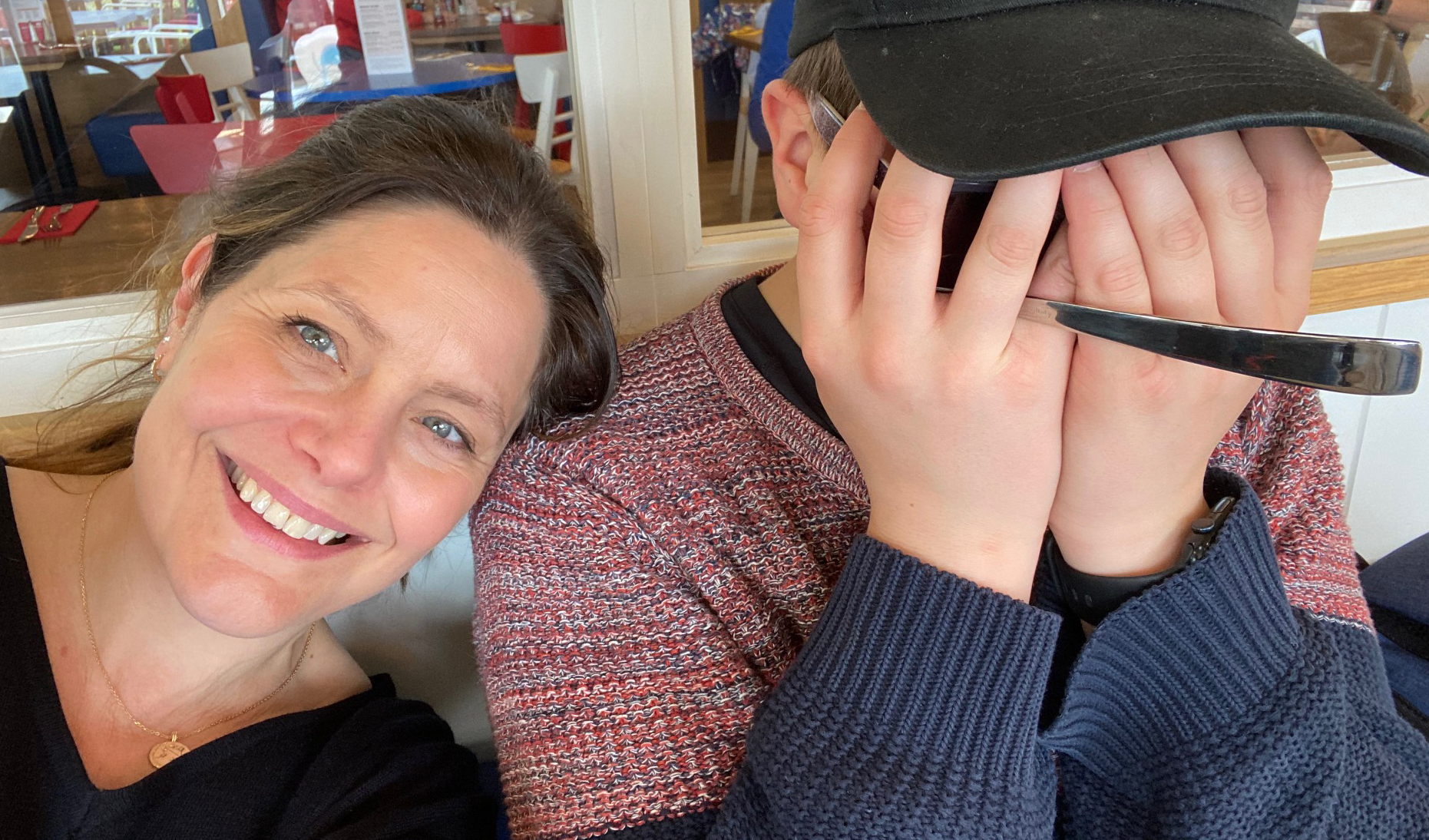
Parenting writer Debra Waters tells us how life has changed since her son became a teenager - and, psychologists explain why it's totally normal.
I recently saw an Instagram post that compared parenting teenagers with white-water rafting, because having teens requires navigational skills through bumpy waters, the ability to respond quickly and correctly, and sheer bravery. What I’ve found most difficult, though, isn’t the door-slamming or being told I’m not allowed to dance/sing/speak/chew – it’s the silences, monosyllabic responses, and reduced physical contact (I miss those hugs!). Gradually, it seemed that my teenager had stopped talking to me.
If you’re parenting – or caring for – a teen you, too, will have had moments when you feel rejected (some say it’s like being ghosted, or like living with your school bully). Your head tells you it’ll pass, your heart says otherwise, but it’s essential not to take it personally. While this is easier said than done, it will benefit both you and your child.
If you’re worried about your teen’s mental health, call the Young Minds Parents Helpline on 0808 802 554 (Mon-Fri, 9:30am–4pm).
When he was younger, my son was affectionate, sensitive and kind. He still is, but he’s also a teenager dealing with a tricky world (do you remember being a teenager? It was hard). Throw in a bunch of fluctuating hormones and it’s no surprise he finds life tough at times. I’ve noticed that as his voice began to drop, so did his mood, and while I tell myself this is natural, there’s a part of me who mourns the happy-go-lucky kid he was.
Friends of both male and female older kids said theirs found Year 7 the most difficult year, and I agree – the step-up to secondary school represents a move away from childhood both physically and emotionally. My son was overwhelmed and anxious and, I have to admit, it made me feel the same way (you’re only as happy as your least happy child, right?). Feeling anxious prevents me from speaking freely, and I’m an adult, so it must be so much more stressful for teens who don’t have the life experience or the benefit of hindsight.
Now my son is 13, he’s bigger and stronger than me, but that doesn’t mean he’s any less fragile – something I think some parents, myself included, forget when we’re faced with children that tower over us. Ironically, although his physical presence is greater, emotionally he’s retreated, but I go to his room regardless – ostensibly, to put the washing away or do a bit of cleaning but, in truth, to let him know I’m here. I don’t expect a response (I’ll get a ‘yes’ or ‘no’ if I’m lucky; a ‘can you get out, mum’ if I’m not) but something is better than nothing.
My son tends to chat when we’re walking or driving, so I take him on errands because when we’re facing forward, rather than looking directly at each other, he finds it easier to talk. I send funny memes to let him know that I’m thinking about him (which he rolls his eyes at, but I do it anyway), and I try to be present when I’m woken at midnight because he can’t switch off his racing brain – yep, those sleepless nights aren’t exclusive to parents of young kids.
But I still find it tough, so I’ve asked experts Dr Mark Rackley, a chartered psychologist and host of the I Have Issues podcast, and Stevie Goulding, senior manager at YoungMinds Parents and Carers Service, what they’d recommend.
Why teenagers start pulling away from their parents
If you’re getting the cold shoulder, you’re witnessing a natural evolution. ‘This is a time where we change from being children to young adults,’ says Dr Mark. ‘We look outside the family for connections – friends become more important and family less so. It’s the beginning of emerging independence. Communication decreases with family and increases with friends.’
So, expect some pulling away – both emotionally and physically. Kids face huge changes that we can’t fully understand (yes, we were teens once, but not in this present time). ‘Remember that teens and tweens have a lot on their plates when navigating things like puberty, identity, social circles, academic pressures, and relationships,’ says Stevie.
‘Young people may want to avoid worrying their parents or carer, or find it easier to talk to friends as they have shared experiences. This can be challenging, but it's important to let young people know you’re always there.’
Things I've tried - and what the experts say
- Not taking it personally It can be really unsettling to be on the receiving end of your child's irritation or – worse – their dismissiveness. It's also a reminder that we're not needed in the same way as when they were younger. Our children’s behaviour can be hurtful but – repeat after me – it’s not about us. ‘Your teenager is changing and seeing you differently,’ says Dr Mark. ‘They see you as someone they don't have as much in common with as their friends.’ Now, if I'm met with a 'leave me alone' or a closed bedroom door, I laugh it off, or I watch a funny show to improve my mood. And I use that extra time I now have for hobbies and exercise.
- Avoiding getting angry Frustration can quickly lead to anger (I'd be lying if I said I'd never raised my voice) but there are ways to control your ire. 'Your patience will be tested, but try not to lose your temper,' advises Dr Mark. 'Count to 10, leave the room, go for a walk – anything to diffuse the situation.' If you do get mad, it's ok to apologise – I make a point to do this – and now, when my son loses his temper, he knows to say sorry.
- Giving them space By this, I don't just mean physical space but mental space, too. 'It can be hard when parents or carers want to speak to their child about what's going on and be met with one word answers, but pick up on cues and respect this,' says Stevie. Over time, I've realised that if my son doesn't feel like talking it's best not to push it. So, if we're having dinner and he doesn't want to talk about school, I'll talk about anything but (the cat, the news, what I'll cook that week). That way, we can have a conversation without it feeling personal.
- Asking open-ended questions These are more difficult to answer with a yes or no response, says Stevie. ‘For example, ask “How are you feeling today?” rather than “Are you okay?”.’ This has been a game-changer in our house – now, I rarely ask a question about my son's day or emotional state that can be given a yes or no answer.
- Listening without prejudice If you're anything like me, when you're met with stony silence you'll start chattering, but it's worth avoiding this. ‘Listen more than you talk and let them tell you what’s happening with them,’ says Dr Mark. When you're not filling in the gaps, they have a chance to talk in their own time. Dr Mark also recommends that in order to 'show that you’re genuinely interested, get to know what they like – TV shows, friends, clothes, music.' If my son shares this sort of info, I'll ask to hear the music he loves or watch an episode of a show he enjoys. And I'll do my best to not compare it to what I like, or liked when I was his age!
- Finding other ways to connect ‘Consider using different communication channels, such as sending WhatsApp messages or passing notes under the bedroom door – these can build your child's confidence and encourage them to speak face-to-face,’ says Stevie. My son and I went through a period of communicating purely by meme (usually funny and animal-related). I'd send him a meme from Instagram, he'd send me one back from TikTok. Then, occasionally, I'd throw in a soppy one about how much I love him – I knew he'd think it was cringe but more often than not I got a heart emoji back. Result.

What other parents say...
Susan, mum of two, London
‘My son is self-contained but I leave him to come to me when he needs to. It seems to work. He’ll talk when I’m making dinner. If I’m worried about him I’ll ask him – he finds this annoying but he will tell me eventually if I give him space.’
Emma, mum of two, Hove
‘I try to keep the lines of communication open without any pressure. Sometimes, that means catching them on their social media channels and accepting they might find it easier to chat via text or DM.
‘Other times I respond with kindness to their grumpiness. Even the hardest-hearted of teens can’t maintain endless sullenness in the face of constant cheeriness. They’re more likely to be sulky in the mornings but have usually levelled out by 9pm, so I’ll approach when they’ve had time to decompress from the day.
‘Also I tell myself that a) hormones play a huge part and b) I was the WORST TEENAGER EVER according to my folks and now we have a super relationship. The best advice is to channel your inner saint, be patient, and know it’s a phase and it WILL pass.’
Sarah, mum of three, Wiltshire
‘It’s important to build a relationship with your teen so that they know they can talk to you without getting into trouble. Shouting and finger-pointing achieves nothing but losing your child’s respect. Sometimes, I notice something’s wrong and park it, then I suggest breakfast out together when we can discuss it in a neutral space without distractions or other family members around.
‘They won’t always confide in you until they’ve processed what’s going on in their life. It took my daughter three years to discuss the details of an incident at school – sometimes you can’t push it. Treat them like a young adult and be respectful of their need for headspace. However much you’d like to know everything, you just won’t. I took the view that as long as they’re talking to someone, that’s ok, but actually telling them they can talk to you if they would like is important, too.’
Here's the five most important things you should talk to your teen about before they start dating, and what to do if your teenager is drawn to taking risks. Some parents are finding caring for their older children so difficult, they're taking 'teen-ternity' leave - we have everything you need to know about the term.







